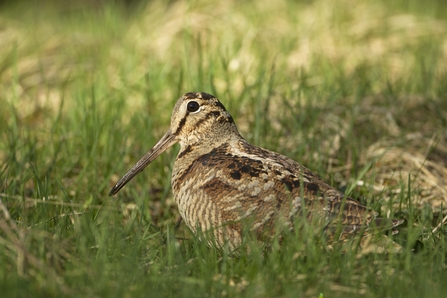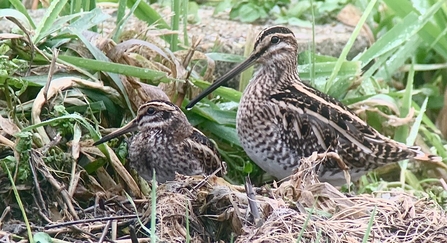3 long-billed wading birds to spot this winter
Snipe
Photo credit: Chris Farthing
Here are three long-billed wading birds to look out for this winter:

©Mark Hamblin/2020VISION
The largest of these three long-billed waders is the woodcock. This dumpy-bodied beauty is found mostly in damp woodland and heathland.
In winter, British breeders are joined by migrants arriving from breeding grounds across the North Sea. Though it’s tricky to predict where they’ll land, places to look include Sydenham Hill Wood, Wimbledon Common and Highgate Wood. That cryptic barred plumage makes them virtually impossible to spot among the leaf litter of a woodland floor, where they grub for invertebrates. During severe winter weather, you could spot one on the move seeking better feeding conditions.
2. Snipe
Snipe
Photo credit: Chris Farthing
The slightly smaller snipe is another British breeder whose population swells in winter, augmented by birds from Iceland, northern Europe and Scandinavia – increasing numbers here more than tenfold.
Though its plumage is also wonderfully patterned and cryptic, the snipe is easily distinguished by its extraordinarily long, slender beak – around a quarter of the length of the body. Roaming marshes and lake margins, its large feet allow it to walk confidently on such soft surfaces. It probes the mud with that slender bill, feeling for prey with sensitive nerve endings at the tip.
3. Jack snipe

Jack snipe and common snipe © Barry Trevis
Jack snipe on left, next to a common snipe on the right
Smaller again than its near namesake, the jack snipe has a shorter bill and creamier head and back stripes. Arriving from the taiga of northern Europe, Scandinavia and even Siberia, and similarly fond of wetlands where it feeds with a characteristic bobbing motion, it’s even more elusive and secretive – and very tricky to see unless flushed.
Where to see them
This wonderful site is great for waterbirds and waders, including snipe and jack snipe.
Ingrebourne Valley (Essex Wildlife Trust)
The mosaic of habitats at Ingrebourne Nature Discovery Centre, in Hornchurch Country Park, is home to water voles, waterbirds and, in its woodlands, woodcock.
Waders, waterbirds, warblers and more – this wetland on the Thames Estuary in Essex hosts wintering snipe and jack snipe.
This expanse of green and blue hosts a variety of birds, and woodcock are present in the damp margins of woodland.
Beddington Farmlands, a 161-hectare Site of Importance for Nature Conservation in south London's Wandle Valley, is being restored as a flagship nature reserve, providing vital habitats for wildlife such as wintering snipe and jack snipe.

